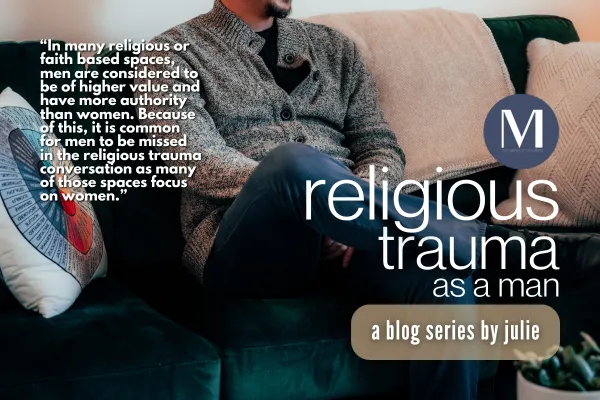the blog
A place for our team to share about topics they are passionate about, in hopes of allowing you to see and understand a bit more behind the faces on these pages.

Religious Trauma: As a Man
I am not a man so I cannot write this from their perspective. I am writing it from the perspective of someone who has had the privilege of sitting with hundreds of men over the years who have shared their stories, their struggles, their hurts, their fears, their joys and accomplishments.
In many religious or faith based spaces, men are considered to be of higher value and have more authority than women. Because of this, it is common for men to be missed in the religious trauma conversation as many of those spaces focus on women. With men being given this value and authority comes a lot of pressure to perform and be perfect. As men they are raised from the time that they are young to be the spiritual leaders of the household, that they are responsible for the household's well being. That their needs and wants come first because of their role, and on the flip side that their needs and wants are not important because it has to be for the good of the faith.
Some of the biggest challenges that the men I’ve spoken with over the years are these ideas that there is no room for weakness. They have to be strong and have all their crap together. They have to be confident but humble. They have to have the faith of a 40+ year pastor and not doubt or have questions. They have to have a good job but being a pastor is the most spiritually revered job. To the point where they need to put aside their own professional dreams to pursue a job in ministry. They have to pursue a woman, not question their sexuality or gender, and even in their pursuit of her they have to remain pure and can’t be sexually driven. They have to maintain control over their children and wife, but not be controlling. They have to be available to their families and have to serve and volunteer at the church or in the community. They have to have their crap together, they’re not allowed to struggle.
These expectations are setting these men up for failure, and to live in a shame spiral. When they don’t meet these expectations, they beat themselves up for not being good enough, being a failure and being a weak man. They are told that they need to confess and do better, and when they try that and it doesn’t work because they’re human and they have human struggles they beat themselves up more and more. They begin to hide their struggles and put on a facade because it's the only thing that seems to keep them in the good graces of the people around them. The issue is that they are deeply hurting and struggling as they persistently feel like they’re not only failing their families, friends, community but also God because they are just a failure and not good enough.
Growing up this way can cause significant trauma for men. The faith based communities can perpetuate this belief that they are terrible human beings and need to be perfect, grovel, or be a martyr for the benefit of the religious community and faith based message. They live in a constant state of feeling the need to be perfect and have their crap together to the point where cutting themselves some slack feels like a sin. Now, remember that not all men experience religious trauma, just as all women don’t either. This is just an example of what it can be like for men, however there are many more examples of men experiencing spiritual abuse and religious trauma. These examples are just the most common ones that I hear as the men in my life share their stories with me.
If you’re a man and you’ve experienced some of what I’ve written about here and haven’t started to talk to someone about it. I would strongly encourage you to start the conversation with someone who is a neutral third party for you. If you don’t have someone in your life that can fill that role, reach out to a therapist as they can be a confidential space for you to start to talk things out. If you’re not sure where to start, feel free to reach out to us. We would be happy to plug you into someone on our team or if you’d prefer we can try to help you find someone outside of our team. Our deep desire is that you don’t have to carry the shame, fear, and guilt any longer of the experiences you’ve had.
Office Location: 1200 Brock Street South, Whitby, ON. L1N 4L9
© Marquis Counselling & Consulting | ALL RIGHTS RESERVED | TERMS & CONDITIONS | PRIVACY POLICY

